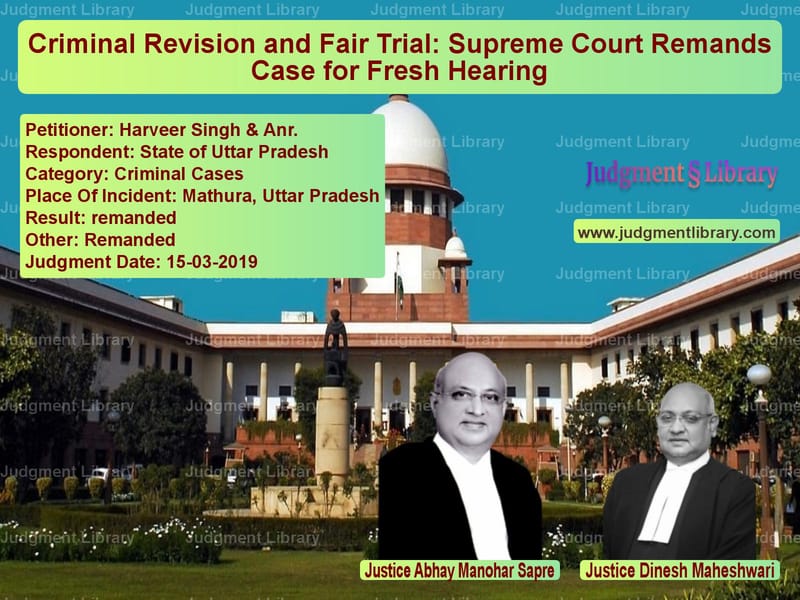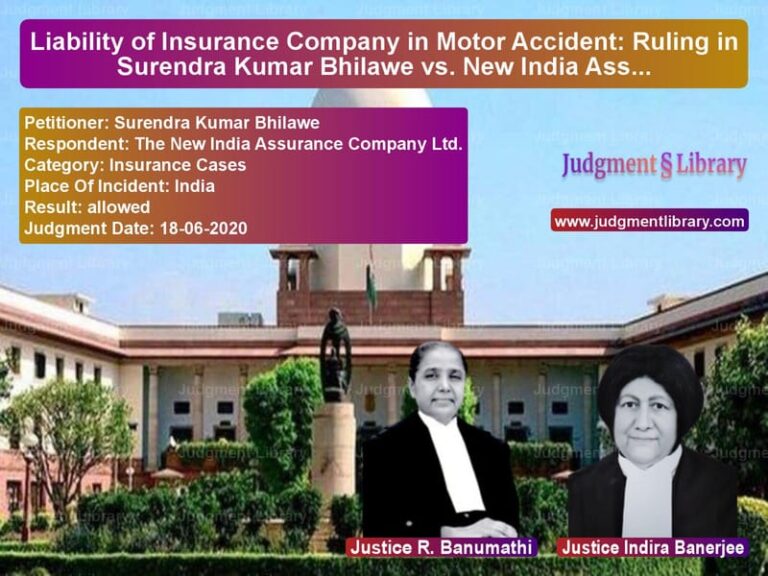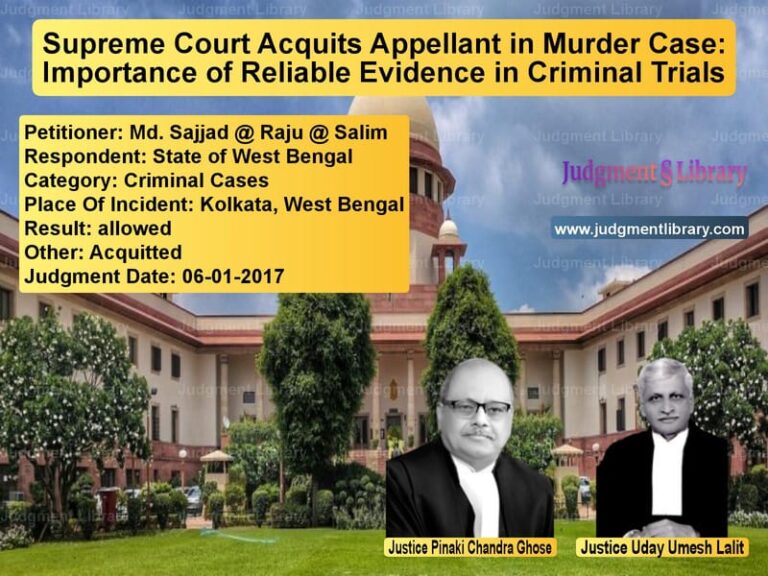Criminal Revision and Fair Trial: Supreme Court Remands Case for Fresh Hearing
The case of Harveer Singh & Anr. vs. State of Uttar Pradesh is an important ruling concerning criminal revisions, fair trial, and judicial reasoning in appellate decisions. The Supreme Court of India, in its judgment dated March 15, 2019, examined whether a High Court can dismiss a criminal revision without providing adequate reasoning and whether such an approach aligns with the principles of justice.
The case arose from a criminal revision petition filed before the Allahabad High Court, challenging the conviction of the appellants under Sections 323, 324, and 452 of the Indian Penal Code (IPC). The Supreme Court reviewed the High Court’s handling of the revision petition and ruled that dismissing the case without a reasoned order was improper. Consequently, the Court set aside the High Court’s decision and remanded the case for fresh consideration.
Background of the Case
The appellants, Harveer Singh and another accused, were charged with voluntarily causing hurt and house trespass under the IPC. The key events were:
- They were accused of entering the complainant’s house and physically assaulting the occupants.
- A criminal case was filed against them under Sections 323 (voluntarily causing hurt), 324 (causing hurt by dangerous weapons), 452 (house trespass after preparation for hurt, assault, or wrongful restraint), 504 (intentional insult to provoke breach of peace), and 506 (criminal intimidation) of the IPC.
- The trial court acquitted the accused in 2008, citing insufficient evidence.
- The State of Uttar Pradesh filed a criminal appeal, and in 2009, the Additional Sessions Judge convicted the appellants under Sections 323, 324, and 452 IPC.
- The appellants filed a criminal revision petition before the Allahabad High Court in 2009, which was dismissed on December 9, 2016, without a reasoned order.
Legal Issues Raised
- Was the High Court justified in dismissing the revision petition without assigning any reasons?
- Should appellate courts provide reasoned orders in criminal revisions?
- Did the High Court fail to consider the appellant’s arguments?
- Should the case be remanded for a fresh hearing?
Arguments by the Petitioner (Harveer Singh & Anr.)
The appellants argued:
- The High Court’s dismissal was improper because it did not provide reasons.
- A reasoned judgment is essential in criminal matters to uphold the right to fair trial.
- The lower courts had overlooked material inconsistencies in the prosecution’s case.
- The conviction was based on weak evidence and should be reconsidered.
Arguments by the Respondent (State of Uttar Pradesh)
The State contended:
- The conviction by the Additional Sessions Judge was well-reasoned and supported by evidence.
- The High Court was justified in dismissing the revision petition as it found no manifest error.
- The appellate court’s findings should not be disturbed as they were based on factual appreciation.
- There was no need to remand the case as the conviction was already upheld by the Sessions Court.
Supreme Court’s Judgment
The Supreme Court ruled in favor of the appellants, holding:
- The High Court failed to apply its judicial mind to the factual and legal aspects of the case.
- A criminal revision cannot be dismissed without assigning reasons for such dismissal.
- The judgment must reflect due consideration of the issues raised by the appellants.
- The case should be remanded to the High Court for a fresh hearing on merits.
The Court observed:
“The least that was expected was that the High Court would apply its judicial mind to the factual and legal aspects arising in the case and then pass appropriate orders either for upholding the conviction or acquitting the appellants.”
Accordingly, the Supreme Court set aside the High Court’s order and directed a fresh hearing within six months.
Key Takeaways from the Judgment
- Reasoned orders are essential in criminal revisions.
- Judicial decisions must reflect proper application of mind.
- Appellate courts must engage with the issues raised.
- Fair trial principles require substantive examination of arguments.
Conclusion
The Supreme Court’s ruling in Harveer Singh & Anr. vs. State of Uttar Pradesh reinforces the importance of reasoned orders in criminal revisions. By remanding the case, the Court ensured that the appellants’ arguments would be fairly heard and judicially examined. This judgment serves as a significant precedent in upholding procedural fairness in criminal justice.
Petitioner Name: Harveer Singh & Anr..Respondent Name: State of Uttar Pradesh.Judgment By: Justice Abhay Manohar Sapre, Justice Dinesh Maheshwari.Place Of Incident: Mathura, Uttar Pradesh.Judgment Date: 15-03-2019.
Don’t miss out on the full details! Download the complete judgment in PDF format below and gain valuable insights instantly!
Download Judgment: Harveer Singh & Anr. vs State of Uttar Prade Supreme Court of India Judgment Dated 15-03-2019.pdf
Direct Downlaod Judgment: Direct downlaod this Judgment
See all petitions in Bail and Anticipatory Bail
See all petitions in Fraud and Forgery
See all petitions in Judgment by Abhay Manohar Sapre
See all petitions in Judgment by Dinesh Maheshwari
See all petitions in Remanded
See all petitions in Remanded
See all petitions in supreme court of India judgments March 2019
See all petitions in 2019 judgments
See all posts in Criminal Cases Category
See all allowed petitions in Criminal Cases Category
See all Dismissed petitions in Criminal Cases Category
See all partially allowed petitions in Criminal Cases Category







